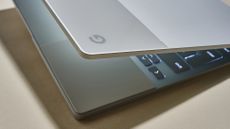

Quick Summary
Google has announced Willow, its latest quantum chip, and has demonstrated computing abilities that vastly outstrip current hardware.
The company continues to research quantum computing, looking to scale the technology to achieve goals currently impossible with regular computers.
Google has unveiled Willow, its latest quantum chip as it showcases progress towards a building a quantum computer. This aims to bring almost unimaginable amounts of power to computing.
To highlight just how powerful Willow is, Google said that it solved a benchmarking test in just 5 minutes – a test that, in comparison, would take today’s best supercomputers 10 septillion years to complete. That's a number that "vastly exceeds the age of the Universe”, it candidly added.
Google said that it was surprised at just how much of a leap ahead Willow achieved compared to the best of current computing. It added that quantum processors “are peeling away at a double exponential rate”. If you think that today’s computers are powerful, they barely even scratch the surface at what could be possible with a quantum computer.
Google isn’t just showing off with its new hardware, which was fabricated at a state-of-the-art facility in Santa Barbara, California, there’s serious science happening here too. The Google team published a paper in Nature, reporting on error correction, addressing a long-standing issue in quantum computing.
Google reports that as more “qubits” are added, the error suppression is greater, which helps pave the way towards a scalable quantum computer that can harness this power to do something useful.
Quantum chips rely on qubits, which is the unit of information in this next-gen hardware. But, unlike the binary bits used in current computers, qubits can exist in a state of 0 or 1 or both at the same time.
At the moment quantum computers are a puzzle for researchers, they are hard to understand and control, but the research is leading to tangible results that might one day result in something extremely powerful and if great use to humanity. Yes, it sounds silly, but proving a real-world application that’s better than current computers is one of the challenges.
Sign up to the T3 newsletter for smarter living straight to your inbox
Get all the latest news, reviews, deals and buying guides on gorgeous tech, home and active products from the T3 experts
Google says that while Willow has completed its benchmark and made new discoveries, some of these things are still within the possibilities of current computers. The aim of quantum computing is to get access to things that currently cannot be achieved.
We’ve already seen the advantages that more power can bring to things like AI and it makes sense to think about quantum computing in the same frame of reference. When you can feed massive amounts of information into your computer and get tangible results from it – be that developing new drugs, designing new battery technologies or understanding fusion reactors – then quantum computing will have something useful to do.
Of course, for all the good a quantum computer could achieve, there’s also the bad – designing new viruses and weapons, cracking encryption codes, unparalleled state surveillance, not to mention the potential for AI power that’s off the current scale.
For better or for worse, that could change the world as we know it.
Chris has been writing about consumer tech for over 15 years. Formerly the Editor-in-Chief of Pocket-lint, he's covered just about every product launched, witnessed the birth of Android, the evolution of 5G, and the drive towards electric cars. You name it and Chris has written about it, driven it or reviewed it. Now working as a freelance technology expert, Chris' experience sees him covering all aspects of smartphones, smart homes and anything else connected. Chris has been published in titles as diverse as Computer Active and Autocar, and regularly appears on BBC News, BBC Radio, Sky, Monocle and Times Radio. He was once even on The Apprentice... but we don't talk about that.
-
 Homey debuts new Dashboards feature but not all Homey users can try it
Homey debuts new Dashboards feature but not all Homey users can try itHomey’s new Dashboards make it easier to control your smart home devices
By Bethan Girdler-Maslen Published
-
 This appliance refrigerates and cooks your food at the same time – in a way you'd never expect
This appliance refrigerates and cooks your food at the same time – in a way you'd never expectIt's set to be unveiled at CES 2025
By Lizzie Wilmot Published
-
 Pixel 9a leaks again, showing Google is heading in a new direction
Pixel 9a leaks again, showing Google is heading in a new directionNewly leaked images of a "Pixel 9a prototype" appear to confirm Google's changed design direction
By Carrie Marshall Published
-
 Productivity 101: how to maximize your life with an AI PC
Productivity 101: how to maximize your life with an AI PCRobert Hallock, VP and general Manager, client AI and technical marketing at Intel explains the advantages of AI computing
By T3.com Published
-
 Google Maps is getting its best free update yet and it’s a game-changer
Google Maps is getting its best free update yet and it’s a game-changerThe best traffic warnings are coming to the main Maps app at last
By Carrie Marshall Published
-
 Google's Pixel Watch Loop Bands seem very familiar, but also refreshing
Google's Pixel Watch Loop Bands seem very familiar, but also refreshingAnd it's compatible with older Pixel Watch models too
By Britta O'Boyle Published
-
 YouTube beats Spotify to the punch with a much-loved feature
YouTube beats Spotify to the punch with a much-loved featureWhat did you listen to most?
By Britta O'Boyle Published
-
 Apple MacBook Pro to get a major rival from an unlikely source, claims report
Apple MacBook Pro to get a major rival from an unlikely source, claims reportCould we see a resurgence of the Pixel name in the laptop world?
By Britta O'Boyle Published
-
 Google TV Streamer finally getting the puzzle piece it's been missing since day one
Google TV Streamer finally getting the puzzle piece it's been missing since day oneSolves my biggest issue with the streaming device
By Rik Henderson Published
-
 Google Pixel Tablet 2 to add a major something that was missing on first-gen, claims report
Google Pixel Tablet 2 to add a major something that was missing on first-gen, claims reportGoogle is said to be preparing the Pixel Tablet 2 with an official keyboard case
By Chris Hall Published
